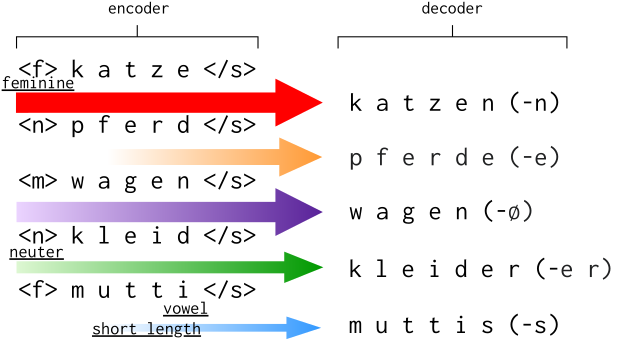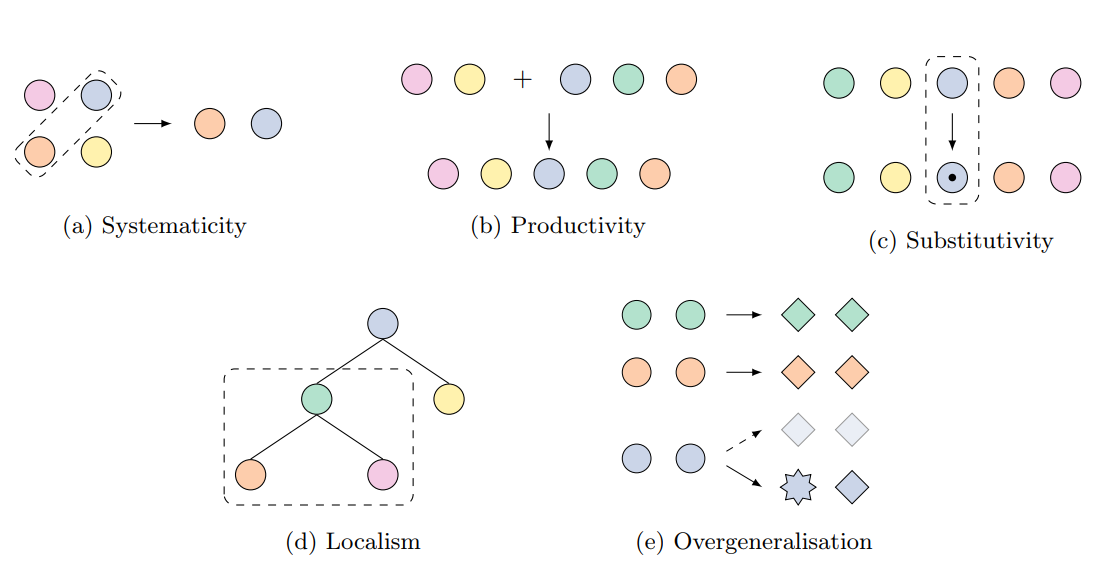Publications
Highlights

Inflectional morphology has since long been a useful testing ground for broader questions about generalisation in language and the viability of neural network models as cognitive models of language. Here, in line with that tradition, we explore how recurrent neural networks acquire the complex German plural system and reflect upon how their strategy compares to human generalisation and rule-based models of this system. We perform analyses including behavioural experiments, diagnostic classification, representation analysis and causal interventions, suggesting that the models rely on features that are also key predictors in rule-based models of German plurals. However, the models also display shortcut learning, which is crucial to overcome in search of more cognitively plausible generalisation behaviour.
Verna Dankers, Anna Langedijk, Kate McCurdy, Adina Williams, Dieuwke Hupkes

The compositionality of neural networks has been a hot topic recently, on which no consensus exists. In this paper, we argue that this in part stems from the fact that there is little consensus on what it means for a network to be compositional, and we present a set of five tests that provide a bridge between the linguistic and philosophical knowledge about compositionality and deep neural networks. We use our tests to evaluate a recurrent model, a convolution-based model and a Transformer, and provide an in depth analysis of the results.
Dieuwke Hupkes, Verna Dankers, Mathijs Mul and Elia Bruni
Full List
The paradox of the compositionality of natural language: a neural machine translation case study.
Verna Dankers, Elia Bruni and Dieuwke Hupkes •
Generalising to German Plural Noun Classes, from the Perspective of a Recurrent Neural Network
Verna Dankers, Anna Langedijk, Kate McCurdy, Adina Williams, Dieuwke Hupkes • CoNLL, Best Paper Award
Attention vs Non-attention for a Shapley-based Explanation Method
Tom Kersten, Hugh Mee Wong, Jaap Jumelet and Dieuwke Hupkes • DeeLIO 2021
Co-evolution of language and agents in referential games
Gautier Dagan, Dieuwke Hupkes and Elia Bruni • EACL 2021
Language modelling as a multi-task problem
Lucas Weber, Jaap Jumelet, Elia Bruni and Dieuwke Hupkes • EACL 2021
Internal and External Pressures on Language Emergence: Least Effort, Object Constancy and Frequency.
Diana Rodriguez Luna, Edoardo Ponti, Dieuwke Hupkes and Elia Bruni • EMNLP-Findings
The grammar of emergent languages
Oskar van der wal, Silvan de Boer, Elia Bruni and Dieuwke Hupkes • EMNLP 2020
Compositionality decomposed: how do neural networks generalise?
Dieuwke Hupkes, Verna Dankers, Mathijs Mul and Elia Bruni • Journal of Artificial Intelligence Research
Location Attention for Extrapolation to Longer Sequences
Yann Dubois, Gautier Dagan, Dieuwke Hupkes, Elia Bruni • ACL 2020
Internal and External Pressures on Language Emergence: Least Effort, Object Constancy and Frequency.
Diana Rodríguez Luna, Edoardo Maria Ponti, Dieuwke Hupkes and Elia Bruni •
Analysing neural language models: contextual decomposition reveals default reasoning in number and gender assignment
Jaap Jumelet, Willem Zuidema and Dieuwke Hupkes • CONLL 2019
Mastering emergent language: learning to guide in simulated navigation
Mathijs Mul, Diane Bouchacourt and Elia Bruni •
Assessing incrementality in sequence-to-sequence models
Dennis Ulmer, Dieuwke Hupkes and Eia Bruni • Repl4NLP, ACL 2019
Transcoding compositionally: using attention to find more generalizable solutions
Kris Korrel, Dieuwke Hupkes, Verna Dankers and Elia Bruni • BlackboxNLP, ACL 2019
On the Realization of Compositionality in Neural Networks
Joris Baan, Jana Leible, Mitja Nikolaus, David Rau, Dennis Ulmer, Tim Baumgärtner, Dieuwke Hupkes and Elia Bruni • BlackboxNLP, ACL 2019
The Fast and the Flexible: training neural networks to learn to follow instructions from small data
Rezka Leonandya, Elia Bruni, Dieuwke Hupkes and German Kruszewski • IWCS 2019
Learning compositionally through attentive guidance
Dieuwke Hupkes, Anand Singh, Kris Korrel, German Kruszewski and Elia Bruni • CICLing 2019
Do language models understand anything? On the ability of LSTMs to understand negative polarity items
Jaap Jumelet and Dieuwke Hupkes • BlackboxNLP, EMNLP 2018